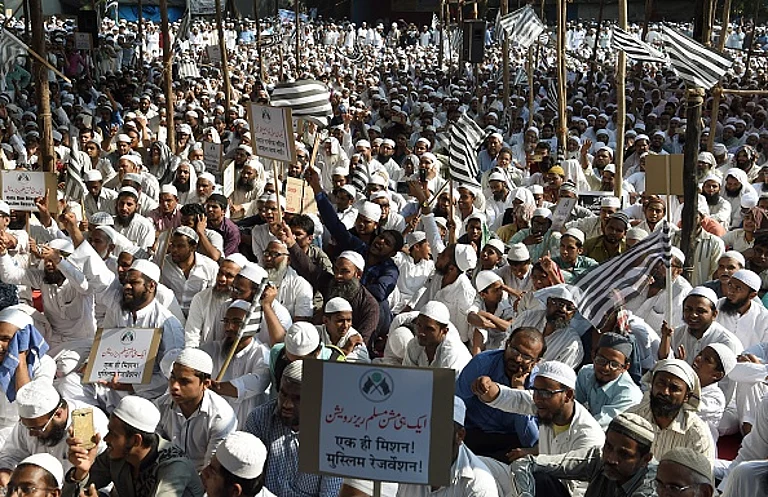The manual of the much talked about Uniform Civil Code (UCC) of Uttarakhand, recently approved by the Pushkar Singh Dhami cabinet, is all set to be enforced from this Republic Day. While the government and the ruling party have showed remarkable enthusiasm for this initiative, the same zeal seems to be absent among the general populace. The code merges provisions from the Hindu Marriage Act of 1955, the Hindu Succession Act of 1956, and the Indian Succession Act of 1925, while dismantling the civil codes of minority communities such as Christians, Muslims, Parsis and Sikhs. This has not only invited dissent from minority groups, but even sections of the Hindu majority have raised objections to certain provisions.
One contentious provision stipulates that individuals who have resided in Uttarakhand for just one year will be considered state residents. This clause directly contradicts the longstanding demands of organisations like the Uttarakhand Kranti Dal, which has been advocating for 1950 to be recognised as the cutoff year for defining native residents. Shanti Prasad Bhatt, Vice President of the Uttarakhand Kranti Dal, views this definition of residency as a betrayal of Uttarakhand's people. According to him, the provision paves the way for outsiders to exploit the state's resources, undermining the rights and identity of the native population. The Mool Niwas Bhukanuan Sanghrsh Samiti leader Mohit Dimari also vehemently opposed this provision of UCC.
Legal experts and social activists have also voiced concerns over the UCC라이브 바카라 implications. Advocate Nadeem Uddin, a former professor at KG Law College, Moradabad, and the author of several legal texts, contends that the code neither serves any section of society nor aligns with constitutional principles. He highlights that Article 44 of the Constitution envisions a UCC applicable nationwide, not restricted to individual states. Moreover, the UCC's exclusion of tribal communities in Uttarakhand undermines its claim to uniformity.
Social activist and advocate Anuradha Singh asserts that Uttarakhand라이브 바카라 UCC is neither truly uniform nor appropriately civil. One of its more problematic aspects is the criminalisation of certain relationships between men and women unless specific procedures are followed.
For instance, living together for more than a month without submitting a formal declaration could result in imprisonment of up to three months and a fine of up to Rs 10,000. This provision could invite moral policing and societal intrusion into private matters. Even if couples are not convicted, the very process of “outing” them can lead to harassment and public humiliation. Part 3 introduces criminal provisions that stand in stark contrast to the 2005 Protection of Women from Domestic Violence Act. While the latter provides essential safeguards for women across India, the UCC라이브 바카라 ambiguous stance threatens to exclude women in live-in relationships from these protections.
Maintenance rights, a cornerstone of the Domestic Violence Act, are rendered uncertain for unmarried women under the new code. Furthermore, the UCC imposes bureaucratic hurdles that actively discourage non-marital relationships. Couples seeking to register their live-in relationship must undergo an inquiry by the registrar, who may demand additional evidence or involve parents and other individuals.
The implications for privacy are profound. Young couples, often driven by economic or social constraints to share accommodations, may face unwarranted scrutiny under the UCC. The code라이브 바카라 provisions may expose such couples to harassment by law enforcement. Activist Trilochan Bhatt from the social organisation Uttarakhand Insaniyat Manch argues that registering live-in relationships essentially forces individuals to make their private lives public. This could lead to communal backlash, particularly in cases where partners belong to different communities. As Bhatt warns, such provisions not only restrict personal freedoms but also risk inciting violence. The UCC thus infringes on fundamental rights guaranteed under Article 21 of the Constitution, which encompasses the right to privacy and personal liberty.
By exposing young adults’ sexual and marital choices to state and societal oversight, the UCC undermines constitutional protections, including the right to equality under Article 14 and the freedom of religion under Articles 25 and 26. Dr. N.K. Pant, a retired law officer of the Uttarakhand government and a constitutional expert, emphasises that even though the UCC has received the President라이브 바카라 approval under Article 254(2), its constitutionality is highly questionable. He predicts significant legal challenges to the law.
The code라이브 바카라 potential to foster communal tensions cannot be overlooked. By mandating public registration of private relationships, it creates a fertile ground for societal and communal interference. This is particularly dangerous in a diverse state like Uttarakhand, where inter-community relationships are already fraught with challenges.
The UCC of Uttarakhand undermines the rights of women and individuals in non-traditional relationships. Its provisions have contradictions, discriminatory practices, and possible constitutional violations that risk deepening societal divisions and eroding individual freedoms. As legal experts, social activists, and concerned citizens continue to raise their voices, it remains to be seen whether the UCC will withstand judicial scrutiny.
(The views expressed here are personal)

















